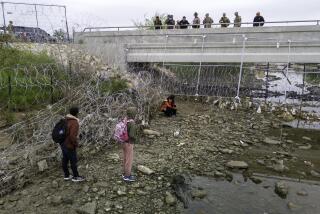Texas Gov. Rick Perry revives TSA pat-down bill
- Share via
The decision by Texas Gov. Rick Perry to revive legislation that would criminalize “intrusive” pat-downs by airport security drew expected praise from grass-roots conservatives, rankled opponents who called it political pandering and reignited threats from federal officials of grounded flights in the state.
But it may not even come to a vote.
HB 41, which would make it a crime for federal agents to touch a person’s anus, genitals, buttocks or breasts without probable cause, is at peril of dying in the state House, as Republican Speaker Joe Straus has pledged not to consider it in its current state.
“The bill — without some serious revisions — appears to me to be nothing more than an ill-advised publicity stunt. Unenforceable. Ill-advised. Misdirected to uniformed security personnel. And not where it appropriately should be aimed, which is in Washington, to the bosses of these people,” Straus told reporters Friday.
Perry ordered that the bill be placed on the Legislature’s agenda for a special session running through June 29. The attempt to limit Washington’s reach in the state appealed to “tea party” members, bolstering support for Perry as he considers a possible Republican presidential bid.
But Straus lambasted the measure as an embarrassment for the Legislature and said a resolution to address the issue could instead be in order.
“I have some other thoughts on how to send a message without actually harming commercial aviation in Texas and without making the Texas Legislature a laughingstock,” Straus said.
In November, the Transportation Security Administration instituted enhanced safety inspections that allow travelers who are asked to submit to a full-body scan to instead undergo a pat-down, which includes TSA agents using their hands to check areas such as the groin and around the bra.
The inspections drew the ire of some passengers, who lodged thousands of complaints with the agency. Some circulated videos of the inspections on YouTube. In one widely seen video clip, a San Diego man warns TSA agents not to “touch my junk” as he refuses to take part in a full-body scan or a pat-down.
Other videos showing a 6-year-old in Kentucky and a toddler in Kansas City, Mo., being frisked sparked criticism that the searches were too intrusive for children. On Wednesday, the TSA announced that it would change the policy to allow for fewer pat-downs of children.
The initial Texas bill died in the regular legislative session last month after threats from the Department of Justice that passage could result in flight cancellations. Perry decided to revive the bill after lawmakers and constituents expressed support for another attempt at addressing the issue at the state level, said Katherine Cesinger, a spokeswoman for the governor.
After the initial bill was passed in the Texas House and sent to the Senate, John E. Murphy, the U.S. attorney for the western district of Texas, wrote a letter to both legislative houses warning that the bill would disrupt the ability of the TSA to ensure the safety of travelers.
He wrote that if the measure were to pass, the federal government would probably attempt to block it by asking the courts for an emergency stay.
The bill then stalled in the Texas Senate.
The House bill’s author, Rep. David Simpson, a Republican from Longview, said that the measure isn’t an attack on airport security, but rather an attempt to preserve the dignity of travelers.
“In any other situation, touching of private parts is sexual assault unless you have probable cause, are in a marriage or other relationship that is consensual,” Simpson said.
TSA spokesman Nico Melendez said that the security measures are based “on what we have learned from intelligence and the tactics used by our adversaries.”
Simpson contends that the TSA’s reasoning is faulty. “They also use body cavities,” he said. “Are they going to do body cavity searches too?”
More to Read
Sign up for Essential California
The most important California stories and recommendations in your inbox every morning.
You may occasionally receive promotional content from the Los Angeles Times.











